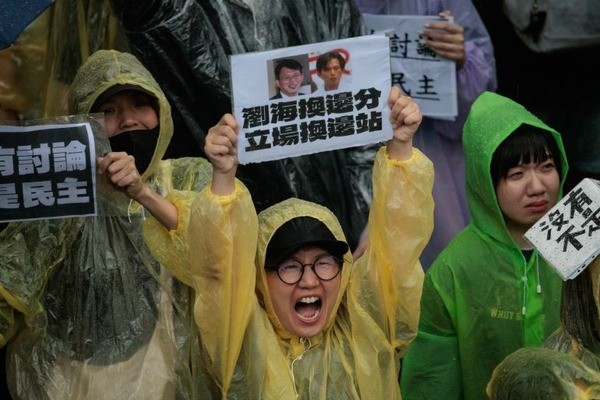Iran’s Plan to Strike Back Against the U.S.
Iran’s Military Preparations Following U.S. Attacks
Loading...

Opposition's attempts to advance a contentious bill have sparked worries regarding the state of democracy on the island.
In Taipei, Taiwan-
protests are set to resume on Friday concerning a contentious bill aiming to significantly broaden the investigative authority of parliament. The bill has already prompted the gathering of thousands of demonstrators on the streets.
Protesters converged outside the legislative assembly on Tuesday during the bill's first reading, with legislators scheduled to convene again on Friday for the second reading.
While many democracies have similar provisions for legislative inquiries, such as the Watergate investigation in the United States or the phone hacking scandal in the United Kingdom, protesters argue that the authors of the Taiwan bill have rushed it through the voting process without adequate checks and balances to prevent potential abuse.
Civil society groups and numerous legal scholars also oppose the bill. However, the Kuomintang (KMT), which supports it, contends that the reforms are essential for "strengthening and refining" Taiwan's democracy. Additionally, the bill includes plans for an ambitious but contentious infrastructure project to connect the island's east and west coasts.
This week's protests were sparked by a scuffle last Friday in the legislature over the same bill, a recurring aspect of Taiwanese political proceedings.
The opposition KMT, along with the smaller Taiwan People’s Party (TPP), secured a majority in parliament in January’s election, while William Lai Ching-te, from the rival Democratic Progressive Party (DPP), was elected president.
Why is this Bill sparking Controversy?
Opponents of the bill argue that its scope is excessively broad and potentially unconstitutional. The bill proposes to grant legislators the authority to question, investigate, or request documents from any government official, military leader, or even the president.
Critics raise concerns about a vaguely worded clause regarding "contempt of the legislature," which they fear could be used punitively against officials who refuse to cooperate. They also contend that the bill duplicates the functions of the Control Yuan, a government body tasked with investigating legislators and auditing the government.
Critics further express apprehension that the bill could jeopardize Taiwan's national security by compelling officials to disclose sensitive information. Austin Wang, a US-based political scientist specializing in Taiwanese politics, highlights the potential risks associated with legislators demanding sensitive military information, especially given past accusations of information leaks to China.
What about the Controversial Infrastructure Project?
The bill also includes provisions for a contentious $61 billion infrastructure initiative aimed at constructing a high-speed rail and enhancing highways along Taiwan's less populated east coast. While this project has garnered less attention, it remains controversial due to concerns about its feasibility and impact on Taiwan's budget.
Wang asserts that the scale of the project is impractical, equivalent to Taiwan's annual budget, and could divert funding needed for military defense against potential threats from China. Moreover, he suggests that Taiwan might be compelled to seek funding from China, its largest trading partner and a country with territorial claims over Taiwan, raising additional security and sovereignty concerns.
Why are Protesters Denouncing the Bill as Undemocratic?
Critics argue that the bill has been rushed through the legislative process without adequate consultation or input from opposition parties. Members of the Democratic Progressive Party (DPP) allege that they did not have full access to the bill's text before it was presented for a vote.
The timing of the bill's introduction coincides with the inauguration of Lai Ching-te, marking the beginning of his unprecedented third term as DPP leader. This has led some observers to interpret the bill as a strategic move by opposition parties, namely the Kuomintang (KMT) and the Taiwan People's Party (TPP), to challenge the DPP's agenda and assert their influence in the legislature.
William Stanton, a former director of the American Institute in Taiwan, suggests that the KMT and TPP may be attempting to undermine the DPP's electoral victory by leveraging their majority in the Legislative Yuan. This perceived power struggle has raised concerns among protesters about the erosion of democratic norms and minority rights.
What does the Public Outcry Suggest about Taiwan's Trajectory?
Taiwan has a rich tradition of protest, and the recent demonstrations are reminiscent of past movements, such as the 2014 Sunflower Movement, which saw student activists occupy the legislature to oppose a trade bill with China. The current protests have also attracted a significant youth presence, indicating a growing sense of political engagement among young people.
The prominence of youth participation is particularly significant given the DPP's recent challenges in mobilizing younger voters, many of whom were drawn to the TPP's promise of fresh leadership under Taipei's former mayor, Ko Wen-je. If the protests continue to gain momentum, they could reshape the political landscape and influence future electoral dynamics.
Iran’s Military Preparations Following U.S. Attacks
Troops remain in five strategic locations, raising fears of renewed tensions and long-term occupation.
Opposition forces have taken control of the capital after a significant offensive. Here is how it unravelled.
